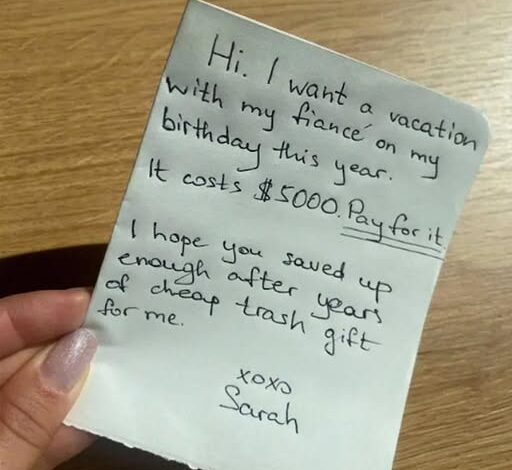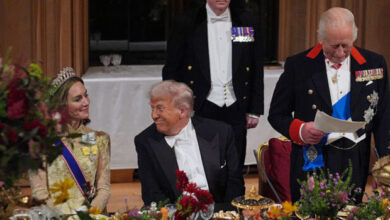
Our Granddaughter Sent Us a Note with Disgusting Text Demanding $5000, So We Decided to Teach Her a Lesson
When my granddaughter Sarah announced her engagement, my husband Jim and I were thrilled. We’d always dreamed of seeing her walk down the aisle, radiant and happy, surrounded by family. We spoke for weeks about how we could help make her wedding day special—whether through financial support, family heirlooms, or simply our presence and love. For us, it was about celebrating her happiness. But just as we were caught up in the joy of planning, everything changed with the arrival of a note that left us stunned.
A few days ago, Sarah mailed us a letter. At first, I thought it might be a sweet thank-you card or a list of wedding details. Instead, what we opened felt like a cold demand. Along with a quotation for a $5,000 vacation package, she had written a message that cut like a knife: “I want a vacation with my fiancé on my birthday this year. Pay for it. I hope you saved up enough after years of cheap trash gifts for me.”
I read those words over and over, struggling to make sense of them. Tears welled up in my eyes as anger and heartbreak tangled inside me. For years, Jim and I had given Sarah the very best we could. We weren’t wealthy, but we poured our hearts into every gift. I had made her handmade quilts, Jim had maintained the old bike she adored as a child, and we had given her jewelry passed down through generations. We had even helped with her car down payment and contributed to her college tuition. Every act of giving was born of love, not obligation. And now she dismissed it all as “cheap trash.”
I showed the letter to Jim. His face darkened with disappointment. “After everything we’ve done for her,” he said quietly, “this is how she repays us?” The betrayal hit us both deeply, but as we sat at the kitchen table staring at the letter, something shifted. Hurt turned into resolve. We couldn’t let this behavior pass without consequence.
We decided Sarah needed to learn a lesson in gratitude. So, we began the painful task of gathering everything we had given her over the years. From the attic, I pulled out the quilts I had spent countless hours stitching. Each one carried memories: Sarah’s favorite colors, patterns chosen with care, my love sewn into every thread. Jim opened the cedar chest with a heavy sigh. “She might not value them now,” he said, “but one day she might understand what she’s lost.”
In the guest room, we found the jewelry box filled with heirloom pieces Sarah had long forgotten. I held up the delicate gold necklace that once belonged to my mother, the same one Sarah had worn to her high school graduation. How could she discard something so meaningful? We carefully wrapped each piece in tissue and added it to the growing collection.
In the garage stood her childhood bike, slightly rusty but still sturdy. I remembered her joy when we first gave it to her, the way she rode up and down the street, hair flying in the wind. Now it was just another symbol of love that had gone unappreciated. We wheeled it out and placed it with the other items. Finally, we gathered photo albums and keepsakes from family holidays and birthdays—snapshots of laughter, warmth, and love that Sarah now seemed to dismiss.
Once everything was packed, we made a difficult decision: instead of leaving these things to collect dust, we would donate them. We drove to a local orphanage, where children without families of their own could cherish what Sarah had discarded. Watching the staff accept the boxes, I felt sadness but also relief. At least the gifts would mean something again.
We also withdrew our financial support for Sarah’s wedding. When I called the wedding planner to explain, she was shocked, but she listened as I shared the truth. “We can’t continue funding someone who treats love like a bank account,” I told her.
Then we sat down to write Sarah one final letter. We told her how deeply her words had hurt us and explained that love isn’t about money or material things—it’s about respect, appreciation, and valuing those who care for you. We hoped she would reflect on her behavior and grow from this painful lesson.
The reaction was swift. Sarah called the next day, furious. “How could you do this to me?” she shouted. “You’re supposed to support me! You’re ruining my life and my wedding!”
I tried to stay calm. “Sarah, we love you, but love doesn’t mean giving in to every demand. This is about helping you grow into someone who understands gratitude.”
Her anger only grew. She hung up, and soon we heard that she was telling relatives how “cruel” we had been. Some family members sided with her, but many reached out to us in quiet support. “You did the right thing,” one cousin told me. “She needed to hear ‘no’ for once.”
Jim and I know our actions were harsh, but we stand by them. Parenting and grandparenting aren’t always about giving; sometimes they’re about teaching, even when the lessons hurt. We hope that, in time, Sarah will realize that entitlement only destroys relationships, while gratitude preserves them.
Love is not measured in vacations or expensive gifts. It is measured in care, respect, and the countless quiet sacrifices made over years. We can only hope Sarah eventually comes to understand that.




